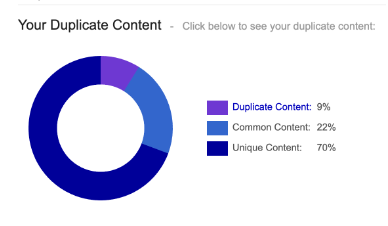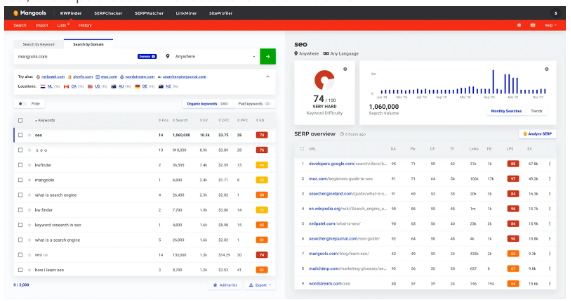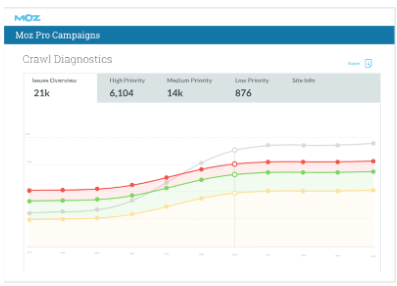How good is the search engine optimization on every single page of your website?
And how sure are you about your answer?
Most B2B brand sites have hundreds of pages. If yours includes a blog, that number could easily be in the thousands.
You could analyze each of these pages manually, one by one. You could also use an eyedropper to drain a swimming pool. Neither are particularly good uses of your time.
SEO website analysis tools use superhuman speed to identify opportunities for optimization. They make the process quicker and easier, while also digging deeper into the data than a human analyst might. (Combined with the expertise of a human analyst, you can really cook up some great insights.)
Here are our agency’s favorite free, free + premium, and paid tools.
14 common SEO website analysis tools
There are dozens of tools that digital marketers can use for SEO. For this list, we’ll look at the ones you are most likely to get immediate utility out of. First, the tools that are free to use:
Free SEO website analysis tools
Yes, Google Analytics has a paid tier, which by rights should put it in the next category. But it’s worth listing first because:
- It’s owned and operated by the world’s largest search engine
- It has enough utility in the free version to warrant its inclusion
Google Analytics makes it easy to analyze which pages are receiving the most organic traffic, how long people are spending on each page, bounce rates and more. All together, these metrics can identify your top performers and which pages need immediate attention.
The first steps of a good SEO audit include checking that your site is properly indexed and checking for algorithm-stopping errors. Google Search Console can help with these tasks, as well as show which keywords your content is currently ranking for.
This simple tool offers quick and detailed analysis of what your actual site users experience.
Use it to discover how fast your page loads on both mobile and desktop, how accessible your site is, and an at-a-glance assessment of its SEO quality. It also includes diagnostics that offer actionable steps you can take to improve your scores.

Microsoft’s Bing runs a distant second to Google for search volume—it owns about 3%, compared to Google’s 83%. However, millions of searches run through Bing, including searches initiated in the Windows search bar, Microsoft Office, Skype, Teams, and beyond.
Use Bing’s suite of tools to examine backlinks, perform keyword research, and audit your entire site for common SEO issues.
This browser-based free tool packs a serious punch. It features an SEO dashboard that gives a quick overview of any given page, including ranking in Google, Bing, and even voice search tools like Alexa.
This browser-based tool offers a wealth of functionality for free. You can enter any domain URL in its search box and get an in-depth scan of up to 250 pages. The results include quick-look graphics, detailed lists, and even downloadable reports. Create a free account and login for up to 30,000 pages of analysis and the ability to view previous results.

SEO tools with free & premium tiers
The big selling point of this tool is that it integrates its own crawler and analysis with Google Search Console to deliver what it calls “SEO Data Fusion.” The free tier offers analysis of a single site with up to 5,000 URLs, with more features unlocked across four additional tiers.
This tool offers a generous amount of functionality in its free tier. You can crawl and audit 500 URLs in a single site, track keywords, and audit backlinks. Paid tiers bring in more functionality, like the ability to schedule tasks and reports and export your data.
In addition to having the most whimsical name in SEO, Screaming Frog’s SEO crawler is a lean but powerful tool for finding SEO issues on your site. The free tier offers up to 500 URLs, while the premium tool can crawl unlimited URLs, in addition to other features.
Part of the Mangools suite of tools, KWFinder offers quick and thorough analysis of keywords around a given topic. You’ll need a free account to take advantage of the tool, and a paid account for access to the entire suite.

Paid SEO tools
The SEO tools that WooRank offers are part of a larger platform it calls a “total marketing solution.” It offers keyword tracking, SEO analysis, and customized reporting.
The Ahrefs suite of tools has a long history of excellence and boasts clients including Adobe, IBM and LinkedIn. It offers automated site auditing, optimization, rank tracking, and keyword generation. Ahrefs even runs its own SEO bot, the most active web crawler of its kind.
While you can use some of Moz’s individual tools for free, the real value lies in using the whole suite you get with Moz Pro. Keyword research, rank tracking, site audits and link research are all included.

Semrush is another marketing platform with tools for SEO, content marketing, marketing research, PPC and social media. Their SEO workflow makes it easy to track your SERP rankings, monitor backlinks, run technical SEO audits, and more.
Start your journey to better SEO
All of these tools can help you better optimize your website, identify common problems, and implement fixes. But each tool has its own learning curve, training regimen, and costs associated. If you don’t already have an SEO expert on your team, it’s worth bringing in outside help.
TopRank Marketing has over two decades of experience with SEO, and we’re up to date on the latest tools and trends, too. Need help getting started? Request a free SEO report card today.
The post Evaluating the Most Common SEO Website Analysis Tools appeared first on B2B Marketing Blog - TopRank®.

0 Commentaires